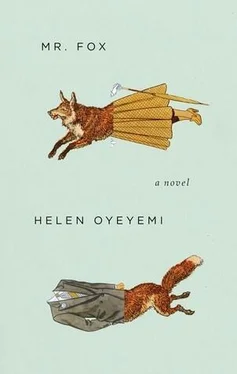“I speak to her in English every day,” I called out. “So she can tell people like you what she thinks.”
We stepped aside then, my daughter and I, and let them continue their patrol.
My mother didn’t like what had happened. But didn’t you see everyone clapping for us, my daughter asked. So what, my mother said. People clap at anything. Some people even clap when they’re on an aeroplane and it lands. That was something my husband had told us from his travels — I hadn’t thought she’d remember.
My daughter became a celebrity amongst the children, and from what I saw, she used it for good, bringing the shunned ones into the inner circle and laughing at all their jokes.
The following week a foreigner dressed like one of our men knocked at my mother’s door. It was late afternoon, turning to dusk. People sat looking out onto the street, talking about everything as they took their tea. Our people really know how to discuss a matter from head to toe; it is our gift, and such conversation on a balmy evening can be sweeter than sugar. Now they were talking about the foreigner who was at our door. I answered it myself. My daughter was at my side, and we recognised the man at once; it was the scrawny soldier. He looked itchy and uncomfortable in his djellaba, and he wasn’t wearing his kaffiyeh at all correctly — his hair was showing.
“What a clown,” my daughter said, and from her seat on the cushioned floor my mother vowed that clown or no clown, he couldn’t enter her house.
“Welcome,” I said to him. It was all I could think of to say. See a guest, bid him welcome. It’s who we are. Or maybe it’s just who I am.
“I’m not here to cause trouble,” the scrawny soldier said. He was looking to the north, south, east, and west so quickly and repeatedly that for some seconds his head was just a blur. “I’m completely off-duty. In fact, I’ve been on leave since last week. I’m just — I just thought I’d stick around for a little while. I thought I might have met a worthy adversary — this young lady here, I mean.” He indicated my daughter, who chewed her lip and couldn’t stop herself from looking pleased.
“What is he saying?” my mother demanded.
“I’ll just — go away, then,” the soldier said. He seemed to be dying several thousand deaths at once.
“He’d like some tea. . ” my daughter told my mother.
“We’ll just have a cup or two,” I added, and we took the tea out onto the veranda, and drank it under the eyes of God and the entire neighbourhood. The neighbourhood was annoyed. Very annoyed, and it listened closely to everything that was said. The soldier didn’t seem to notice. He and my daughter were getting along famously. I didn’t catch what exactly they were talking about, I just poured the tea and made sure my hand was steady. I’m not doing anything wrong, I told myself. I’m not doing anything wrong.
The scrawny soldier asked if I would tell him my name. “No,” I said. “You have no right to use it.” He told me his name, but I pretended he hadn’t spoken. To cheer him up, my daughter told him her name, and he said, “That’s great. A really, really good name. I might use it myself one day.”
“You can’t — it’s a girl’s name,” my daughter replied, her nostrils flared with scorn.
“Ugh,” said the soldier. “I meant for my daughter. . ”
He shouldn’t have spoken about his unborn daughter out there in front of everyone, with his eyes and his voice full of hope and laughter. I can guarantee that some woman in the shadows was cursing the daughter he wanted to have. Even as he spoke someone was saying, May that girl be born withered for the grief people like you have caused us.
“Ugh,” said my daughter.
I began to follow the conversation better. The scrawny soldier told my daughter that he understood why the boys lined the roads with anger. “Inside my head I call them the children of Hamelin.”
“The what?” my daughter asked.
“The who?” I asked.
“I guess all I mean is that they’re paying the price for something they didn’t do.”
And then he told us the story of the Pied Piper of Hamelin, because we hadn’t heard it before. We had nightmares that night, all three of us — my mother, my daughter, and I. My mother hadn’t even heard the story, so I don’t know why she joined in. But somehow it was nice that she did.
On his second visit the scrawny soldier began to tell my daughter that there were foreign soldiers in his country, too, but that they were much more difficult to spot because they didn’t wear uniforms and some of them didn’t even seem foreign. They seemed like ordinary citizens, the sons and daughters of shopkeepers and dentists and restaurant owners and big businessmen. “That’s the most dangerous kind of soldier. The longer those ones live amongst us, the more they hate us, and everything we do disgusts them. . These are people we go to school with, ride the subway with — we watch the same movies, root for the same baseball teams. They’ll never be with us, though. We’ve been judged, and they’ll always be against us. Always.”
He’d wasted his breath, because almost as soon as he began with all that I put my hands over my daughter’s ears. She protested loudly, but I kept them there. “What you’re talking about is a different matter,” I said. “It doesn’t explain or excuse your being here. Not to this child. And don’t say ‘always’ to her. You have to think harder or just leave it alone and say sorry.”
He didn’t argue, but he didn’t apologise. He felt he’d spoken the truth, so he didn’t need to argue or apologise.
Later in the evening I asked my daughter if she was still racist against soldiers, and she said loftily, “I’m afraid I don’t know what you’re referring to.” When she’s a bit older I’m going to ask her about that little outburst, what made her come out with such words in the first place. And I’m sure she’ll make up something that makes her seem cleverer and more sensitive than she really was.
We were expecting our scrawny soldier again the following afternoon, my daughter and I. My daughter’s friends had dropped her. Even the ones she had helped find favour with the other children forgot that their new position was due to her and urged the others to leave her out of everything. The women I knew snubbed me at market, but I didn’t need them. My daughter and I told each other that everyone would come round once they understood that what we were doing was innocent. In fact we were confident that we could convince our soldier of his wrongdoing and send him back to his country to begin life anew as an architect. He’d confessed a love of our minarets. He could take the image of our village home with him and make marvels of it.
Noura waited until our mothers, mine and hers, were busy gossiping at her house, then came to tell me that the men were discussing how best to deal with me. I was washing clothes in the bathtub and I almost fell in.
My crime was that I had insulted Bilal with my brazen pursuit of this soldier. .
“Noura! This soldier — he’s just a boy! He can hardly coax his beard to grow. How could you believe—”
“I’m not saying I believe it. I’m just saying you must stop this kind of socializing. And behave impeccably from now on. I mean — angelically.”
Three months before I had come to the village, Noura told me, there had been a young widow who talked back all the time and looked haughtily at the men. A few of them got fed up, and they took her out to the desert and beat her severely. She survived, but once they’d finished with her she couldn’t see out of her own eyes or talk out of her own lips. The women didn’t like to mention such a matter, but Noura was mentioning it now because she wanted me to be careful.
Читать дальше












